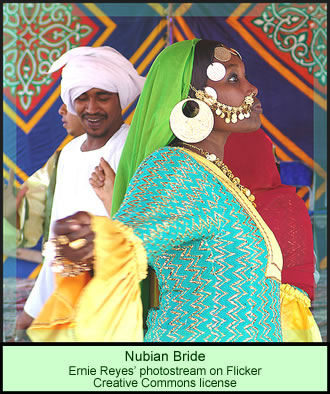With all the stresses the Nubians have faced recently in a rapidly changing Egypt, their marriage customs seem to persist, at least in villages in the Aswan area where some of them still live. An article in an English language Egyptian daily paper last week described a wedding in Upper Egypt as “a magnificent and impressive experience.”
 Preparations for a wedding begin shortly after the families agree on the proposal for a marriage. The night before the wedding, the two families and the friends of the bride and groom participate in what is called Henna Night. Henna, a reddish orange preparation made from the leaves of the henna plant (Lawsonia inermis), is rubbed on the backs of the bride’s hands by her family and female friends. In a separate room, the family and male friends of the groom rub henna on the palms of his hands and on his feet.
Preparations for a wedding begin shortly after the families agree on the proposal for a marriage. The night before the wedding, the two families and the friends of the bride and groom participate in what is called Henna Night. Henna, a reddish orange preparation made from the leaves of the henna plant (Lawsonia inermis), is rubbed on the backs of the bride’s hands by her family and female friends. In a separate room, the family and male friends of the groom rub henna on the palms of his hands and on his feet.
Once the henna has dried, the bride enters the room where her groom sits waiting. His family and friends stand in two rows and greet her, dressed in their white galabiyas. They drum on tambourines, and someone sings Nubian songs. The bride is outfitted in a colorful dress covered by a transparent galabiya. She is adorned with gold pieces.
The bride and groom dance together, surrounded by their friends and families, clapping and swaying to the music. The festivities, which continue until dawn, are broken only by a big dinner. In the morning, the groom slaughters a sheep or a calf so the meat can be shared with the poor.
The festivities begin again later in the afternoon when the male friends of the groom reassemble at his house and resume playing the tambourine and singing. People join in the singing; they process around the village, inviting everyone to come to the wedding that evening.
Meanwhile, the bride and her female friends travel to Aswan to visit a hairdresser and put on her makeup. After sundown, the groom and his family go to the city in a hired bus to meet her. They all go to a photographer to have their pictures taken, then return to the village to continue the wedding celebration. The groom gives his bride the traditional gift of gold jewelry, called a shabka. Her friends and family also give her presents. They continue celebrating much as they did the previous night, including another feast.
In cities like Cairo, visiting the newlyweds in their homes starts on the following day, but in the traditional Nubian villages of southern Egypt, relatives will wait until the seventh day after the marriage to visit the couple. Friends will visit them two days after that.